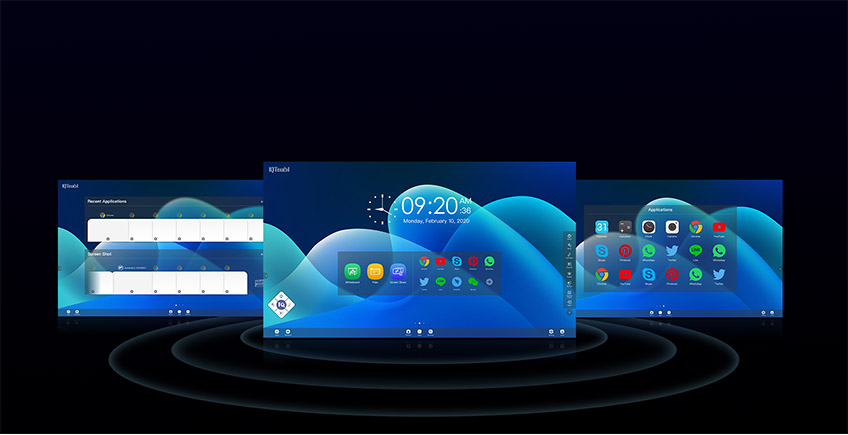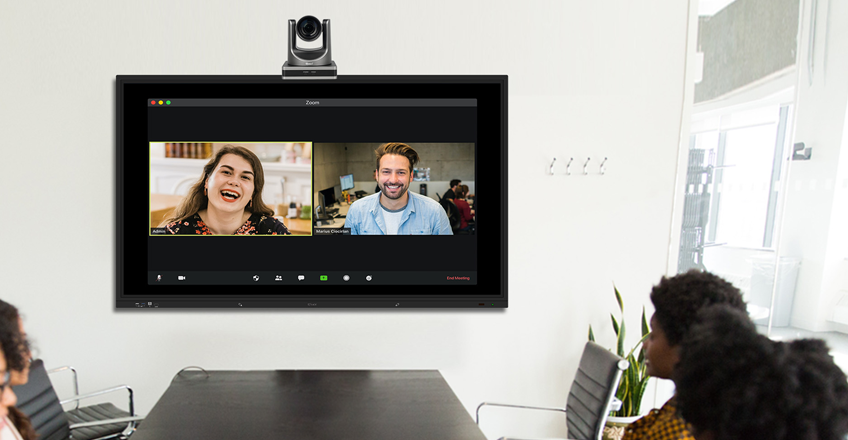1. Introduction
In the realm of interactive flat panels, IQTouch HA1100 Pro stands as a revolutionary solution that is poised to transform both the educational and corporate landscape. This remarkable device, equipped with state-of-the-art technology, redefines how we engage with information, enabling a whole new level of interactivity, engagement, and collaboration. In this article, we will delve into the depths of what makes the IQTouch HA1100 Pro so extraordinary, from its technical specifications to its myriad applications in classrooms and boardrooms.

2. Product Introduction
In the following, we invite you to see a detailed product introduction to explore the cutting-edge features and applications of HA1100 Pro.
2.1 IQTouch HA1100 Pro: A Glimpse of the Future
The IQTouch HA1100 Pro is an interactive flat panel from IQ that boasts a plethora of advanced features and technologies. At its core, it incorporates Android 11 technology, with 40-point touch capability, this device sets the stage for immersive and collaborative experiences.
2.2 Optical Bonding Technology
One of the standout features of the HA1100 Pro is its utilization of optical bonding technology. This innovation involves applying a special AB silicon gel between the cover glass and the LCD panel, thereby eliminating the air gap between them.
The benefits of this technique are truly remarkable.
l Elimination of Air Gap: Optical bonding involves the application of a special AB silicon gel between the cover glass and the LCD panel, effectively eliminating the air gap between them.
l Enhanced Brightness: The absence of the air gap results in significantly improved screen brightness, making content more vibrant and easier to see.
l Superior Contrast: Optical bonding enhances contrast, ensuring that colors appear more vivid and text is sharper and more legible.
l Enhanced Light Transmittance: By removing the air gap, light transmittance is improved, which means the screen is better at displaying images and videos with clarity.
l Elimination of Light and Shadow Effects: With the air gap gone, the screen shows no light and shadow effects, providing a consistent and high-quality viewing experience.
l True 178°Viewing Angle: The optical bonding technology ensures a genuine 178° viewing angle, making the screen easily visible from various positions.
l Enhanced Durability: The bonding process significantly enhances the screen's physical durability, making it more robust and resistant to damage.
l Pen-on-Paper Writing Experience: The technology provides an exceptional writing experience, making it feel as if you're writing on paper, fostering natural and precise interactions.
l Condensation and Contamination Prevention: With no air gap, the issues of condensation and contamination are effectively eliminated, ensuring consistent screen performance.
l User-Centric Design: Optical bonding enhances the user experience by providing a visually appealing and highly responsive screen.
Optical bonding is a technology that truly transforms the display quality, offering an immersive and engaging experience for users in various applications.
2.3 Blue Light Filtering
With increasing concerns about the harmful effects of blue light from screens, the HA1100 Pro incorporates blue light filtering technology. This feature significantly reduces the amount of blue light emitted by the screen, safeguarding the eyes of both teachers and students during long hours of use. This ensures a healthier and more comfortable learning or working environment.

2.4 Dual-Camera Technology
The HA1100 Pro features a dual-camera setup. The front-facing camera is a 4K AI-powered camera designed for automatic tracking of conference participants and capturing classroom activities. It precisely positions itself and switches focus between speakers during video conferences, ensuring ultra-clear picture quality in varying lighting conditions. Whether you're in a small huddle room or a vast conference hall, more participants will be seen clearly. The periscope camera serves as a groundbreaking periscope-design document camera, enabling clear capturing of A3 shooting area and scanning QR codes for presentations. With 13 megapixels and auto-focus functionality, this additional camera is a one-stop solution for meeting room collaboration.
Compare to MAXHUB V6 also using similar chipset solution, HA1100 Pro stands out in its dual camera feature, a more functional and elegant product for high-end conference scenario and education scerarion to faciliate the remote conferecning and remote learning.
2.5 Advanced Audio System
In the audio department, the HA1100 Pro boasts an array of features, including 8 microphones, a 2.1 stereo sound system, and powerful speakers delivering 20W (Speaker) x 2 and 15W (Subwoofer) x 1. These enhancements result in enhanced voice pickup even at a distance and a more immersive acoustic environment. You can be assured of powerful and crystal-clear audio in larger video conferencing rooms, providing an enriched experience.
2.6 AG+AF Glass and More
The inclusion of AG+AF (Anti-Glare and Anti-Fingerprint) glass ensures that the screen remains smudge-free and easily readable, even in well-lit environments.
With 4K wireless screen sharing capabilities, the HA1100 Pro facilitates seamless collaboration by allowing users to share their screens wirelessly, promoting interactive presentations and discussions.
Furthermore, the Plug&Play USB-C functionality simplifies connectivity, making it easier than ever to connect various devices to the HA1100 Pro.
The customizable front button adds a layer of convenience and personalization to the user experience.
3. Product Highlights
3.1 A Breakthrough in Optical Bonding
Optical bonding technology is the cornerstone of the HA1100 Pro's excellence. By eliminating the air gap between the cover glass and the LCD panel, it achieves unparalleled results in terms of brightness, contrast, light transmittance, and the elimination of light and shadow effects. This ensures a genuine 178° viewing angle and enhances screen durability. The result is a writing experience akin to pen on paper, breathing life into every stroke and gesture.
3.2 Protecting Your Eyes with Blue Light Filtering
As the concerns surrounding the impact of blue light on our eyes grow, the HA1100 Pro takes this issue seriously. By implementing blue light filtering technology, it ensures a safer and more comfortable environment for extended periods of screen use, particularly in educational settings.
3.3 Dual-Camera Innovation
The HA1100 Pro's dual-camera system brings unprecedented functionality to the table. The 4K AI-powered front-facing camera automatically tracks participants in video conferences and captures classroom activities, delivering ultra-clear visuals under varying lighting conditions. The under-panel 4K document camera is a game-changer for presentations, offering clear and precise capturing of large documents and QR codes.
3.4 Immersive Audio Experience
With its advanced audio system, featuring 8 microphones, a 2.1 stereo sound setup, and powerful speakers, the HA1100 Pro ensures crystal-clear audio in even the largest of video conferencing rooms. The audio quality immerses users in their discussions, making remote collaboration feel like an in-person meeting.
3.5 Seamless Connectivity
With features like AG+AF glass, 4K wireless screen sharing, and Plug&Play USB-C, the HA1100 Pro brings effortless connectivity and sharing capabilities to the forefront. The AG+AF glass ensures a clear, smudge-free display, while the wireless screen sharing and Plug&Play USB-C make connecting devices a breeze.

4. Usage Scenarios
After getting an understanding on the introduction and highlights of HA1100Pro, let's take a look at the usage scenarios of IQTouch HA1100Pro.
4.1. Classroom Scenarios
Now, as we go into classroom scenarios, you'll discover how the HA1100 Pro revolutionizes the learning experience for educational occasions.
4.1.1 Empowering K-12 Education
Enhanced Focus on Lessons: With glare and reflections minimized by optical bonding technology, students are better able to focus on the teacher's presentations and written content on the screen. This is particularly crucial for younger students in K12 education, as it promotes better concentration and engagement in the learning process.
Simplified Teaching Content Display: Teachers can easily place toys or educational props under the document camera for instant display on the HA1100 Pro's screen. This simplifies the process of presenting teaching content to young children, making lessons more engaging and interactive. The document camera's 4K resolution and auto-focus functionality ensure that every detail is visible.
4.1.2 Transforming Higher Education
In the higher education sphere, this interactive flat panel takes learning to a whole new level. Professors can deliver engaging lectures, seamlessly annotate content, and encourage collaboration among students. With its 4K document camera and dual-camera technology, it becomes easier to capture and share complex diagrams, research findings, and presentations, enhancing the overall learning experience.
Overcoming Distance and Visual Impairments: For students who may struggle with visual impairments or those seated at a distance from the main screen, wireless screen sharing ensures that they can view the teaching material with ease. This technology eliminates the need for squinting or straining to see the content, thus enhancing the overall learning experience.
Interactive Learning: With wireless screen sharing, students can engage more actively with the material being presented. They can follow along, ask questions, and interact with the content directly from their own devices, such as laptops or tablets. This feature is particularly valuable in larger lecture settings, where student engagement can be challenging.
Collaborative Learning: The wireless screen sharing feature also fosters collaborative learning. Students can easily share content with their peers, work on group projects, and present their findings, creating a dynamic and interactive classroom environment.

4.2. Meeting Room Scenarios
HA1100 Pro proves to be an crucial asset to elevates corporate collaboration and communication.
4.2.1 Revolutionizing Corporate Meetings
The HA1100 Pro isn't just limited to education; it's a game-changer for corporate environments too. In boardrooms, small huddle spaces, or expansive conference halls, it facilitates productive and interactive meetings. The 4K AI camera automatically tracks speakers during video conferences, ensuring clear and focused communication, regardless of room size. Collaborative tools like document sharing, annotation, and screen mirroring make presentations more engaging and interactive.
4.2.2 Efficient and Collaborative Remote Work
The HA1100 Pro's adaptability makes it perfect for remote working environments. Teams can use it to collaborate effectively, whether they're in the same room or dispersed around the globe. The device's capabilities allow for clear and efficient video conferences, with its powerful audio system ensuring that wider participant's voice is heard clearly, fostering meaningful remote collaborations.
5. Conclusion
The IQTouch HA1100 Pro is a groundbreaking device that combines innovative technology with user-friendly design. In both educational and corporate environments, it reshapes the way we teach, learn, and collaborate. Its optical bonding technology, blue light filtering, dual-camera system, and exceptional audio capabilities ensure a superior user experience. The HA1100 Pro is not just a device; it's a catalyst for active learning, meaningful collaboration, and efficient communication.
As we wrap up this exploration of the IQTouch HA1100 Pro, we encourage you to experience its potential firsthand. Reach out to us to learn more, arrange a demonstration, and unlock a new world of interactive and collaborative possibilities. The future of education and business is here, and it begins with IQTouch HA1100 Pro.
Here are some other articles that we think might interest you:
The Seven Benefits of Interactive Flat Panels: Moving Beyond the Whiteboard
How to Choose the Right Interactive Flat Panel for Your Presentation Needs
Why Interactive Flat Panels are Widely Used in Education?